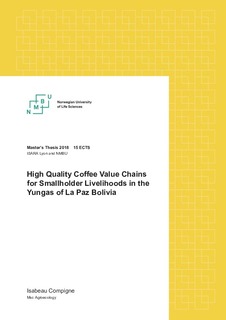| dc.description.abstract | In Bolivia, the coffee sector is of great importance for many farmers in the country, especially in the Yungas region, where it involves more than 17,000 families. Unfortunately, in the past three years, coffee export has experienced an important decrease attributed to lack of livelihood capitals such as lack of maintenance of older plantations, inadequate access to credits, limited governmental support and administrative problems of producer’s cooperatives. Instead of focusing on increasing volumes and/or certifications to intend to improve producers’ livelihoods, it has been highlighted that the focus could rather be put on improving quality. In the literature I found very little information about high quality coffee (HQC) value chains and their impact on coffee farming families’ livelihoods.
Therefore, this research investigates on the potential of the participation in HQC markets on farming families’ livelihoods in the Yungas. The research has been conducted during on-site fieldwork in the Yungas, with observation (participant observation of four coffee producing families and informal conversation with members of families and other professionals in the coffee sector) and semi-structured interviews with one member from each family and two professionals from local high quality coffee roasting companies. Coffee smallholders in the Yungas find improvement in their financial and social capital mostly by selling HQC through direct trade. Moreover, producers will gain more financial benefits by processing themselves their HQC. However, producers who might want to participate in HQC markets, still lack access to this market as well as infrastructures and knowledge to process HQC. Possibility to reimburse credits, capacity to manage finances and work force accessibility are also limits to producers’ livelihood alleviation. In addition, coca leaves production still play an important role in coffee producers livelihoods in the Yungas. The producers’ natural capital is reduced due to their management of HQC and coca, in which they use inorganic agricultural inputs and by deforestation of primary forests. By involving in HQC coffee producers can improve their livelihood, but there is still a large effort to be done in order to facilitate access to this market and to reduce producers’ vulnerability to health and natural shocks. | nb_NO |

